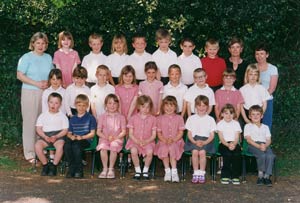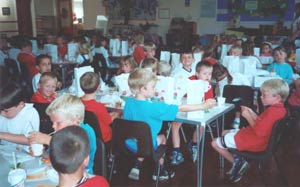Providing effective speech and language therapy for children with Down syndrome in mainstream settings: a case example
A description of how a specialist speech and language therapist has been working with a child with Down syndrome, who attends a mainstream primary school.
Bird, G, and Thomas, S. (2002) Providing effective speech and language therapy for children with Down syndrome in mainstream settings: a case example. Down Syndrome News and Update, 2(1), 30-31. doi:10.3104/practice.163
Sue Thomas, Specialist Speech and Language Therapist, has been working with Luke since he was 5 years old, at his parent's request. They pay for this provision as it was their wish to see an independent therapist who could allocate more intensive time to school visits, and felt that the benefits of following Luke through the school years would give their overall objectives for him consistency and ongoing measurement. Consistency is usually a strong priority for parents and encourages active participation from them (see Luke's mother's letter). I contacted Sue to find out how she had worked with Luke and I have summarised our discussion. Gillian Bird.
During the three years that Sue has been working with the school and Luke's parents, Luke has moved from being at between the 1 to 2 word comprehension level on the Derbyshire Language Scheme and using single word, unclear speech to now, aged 7 years 11 months, having comprehension at the 4 information carrying word level on the Derbyshire Language Scheme and using 3 words/ideas in a sentence e.g. "the boy gave the girl her book". Luke now listens really well and has a short-term auditory memory span of 4 items. He now initiates communication and dialogue with his peers, which is of enormous benefit to his self-esteem and confidence.
Of course, Luke learned to read at school. They have made full use of conversation diaries and he can say long, familiar sentences. He can read, spell, and is just at the stage of writing a sentence independently. As well as all the reading together and reading aloud that Luke has experienced through differentiated work, they have also used reading deliberately as speech and language therapy. For example, reading aloud slowly, emphasising the patterns of words and sentences, from 'walking' ('ing' part emphasised) or watched (ed emphasised with a 't' letter sound), to reading whole phrases with exaggerated intonation and syllable formation.

Luke with his class
There has also been an emphasis on an adult - usually the Learning Support Assistant (LSA) - reading the text and Luke pointing and then reading word by word, not too fast. Sometimes a tape recorder was used with this method, so that Luke could hear himself. Clusters and polysyllables have been worked on in this way. Sue did not work much on individual sounds with Luke (although he could read and learned letter sounds through literacy) but did do a lot of patterning work, for parts of words and words in sentences.
Sue's programme for Luke included general language work, and the school successfully used the Derbyshire Language Scheme activities, particularly receptive language and listening games.
Sue pointed out that Luke is very well behaved and has worked very hard. He has had excellent support from an LSA who received training, including training in the Derbyshire Language Scheme, a Special Needs Assistant course, and a speech and language therapy course for LSAs. Consequently, she has a good understanding of how language and communication skills develop. Sue has also helped the school with differentiation of the curriculum for Luke, from about Year 2.
For success she thinks three things are particularly important:-
- the quality of the programme
- the time spent with school and parents
- a positive attitude to supporting mainstream education with age-appropriate treatment and full inclusion.
Her way of working is:
- spend half a day in school once every term, observing the LSA doing speech and language activities with child (she films sometimes)
- work with the child
- meet with the LSA, Special Educational Needs Co-ordinator (SENCO) and the child's class teacher
- devise activities and demonstrate these to the LSA, SENCO and class teacher. Visit parents at home, for discussion and demonstration of activities, and make any adjustments
- write up programme and send
This could take much more time than a typical speech and language therapy visit, especially the demonstration of activities, and monitoring how they are delivered by the LSA. However, Sue does not think this is needed more than once per term. She has some two weekly sessions (e.g. where working for a school contract or because it is specified on a child's statement) and thinks this is too often - the children have not had enough time to practice the activities to show sufficient progress and for her to be able to monitor this.

Luke at school, Summer 2001
With all school age children she thinks this is the case, even for speech work, provided the LSA has been shown and taught how to do the speech work. Twice a term would be a maximum she thinks, and that once a term is adequate, with a programme of a high quality and enough material for the educational team to follow and use. It is the quality of the daily speech and language interaction with a child and daily practice of extra activities that will make a difference to their progress, rather than therapy sessions.
She is obviously thrilled with Luke's progress.
Resources
Click here to see a list of inclusion resources.

